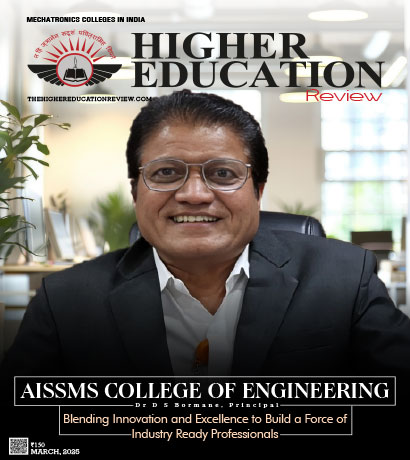What Top Qualities Do Employers Seek When Hiring

Soumitra Das, Global CHRO, Redington
In a conversation with Higher Education Review Magazine, Soumitra Das, Global CHRO, Redington, shared his views and thoughts pertaining to the top qualities employers seek when hiring. He is a senior global HR leader with extensive experience in driving strategic and innovative HR solutions in diverse organizations across Manufacturing, Engineering, Automobile, IT, Professional Services, Healthcare and distribution domains. With his vast experience in HR leadership roles in publicly traded Indian, US & European companies, his professional journey encompasses roles at Tata Steel, Compaq, Hewlett- Packard, Siemens, Nuance and Redington Group.
What foundational hard skills do recruiters consider essential for candidates across all roles? Are there specific technical skills or knowledge areas that are universally valued?
To ensure that a new employee is a good fit in terms of the role and the organization culture, recruiters focus on both hard and soft skills. Foundational hard skills are mostly role specific and directly impact the employee’s ability to perform well in the role and contribute to the organization’s success.
Domain or functional knowledge and computer skills are the most important hard skills that recruiters assess during the hiring process. Fluency in Microsoft Office (Outlook, Word, Powerpoint, Excel), email management and digital literacy skills are critical to success hard skills.
Domain related technical skills, specifically for technical hires are critical. Fundamental knowledge of Cyber Security, AI, Data Analytics and project management are universally valued.
What role do transferable skills play in the recruitment process? How do recruiters identify and assess transferable skills that candidates bring from other roles? Are there specific transferable skills that are particularly valued?
Transferable skills are those that can be migrated across
different roles in an organization and play a crucial role in the recruitment process because they demonstrate a candidate’s ability to be multiskilled and apply previous knowledge and experience to new roles irrespective of the industry, function or context.
Recruiters assess transferable skills by ascertaining a candidate’s ability to adapt and adapt to a new role or a new ecosystem by leveraging their broad range of skills and competencies. Psychometric assessments, case studies, simulation, etc., are some methodologies used to assess transferable skills, which are typically good interpersonal communication skills, problem-solving & decision-making skills, analytical skills, team-building skills, conflict resolution skills, digital skills, and leadership skills. Some of these transferable skills are highly valued during recruitment.
What soft skills are universally important for candidates in any role? How do recruiters evaluate essential soft skills like communication, teamwork, and problem-solving?
Some of the soft skills that are universally important for candidates in any roles are, the ability to quickly adopt and adapt to the organization culture, good interpersonal communication skills, effective time management, ability to work collaboratively in teams, demonstrating leadership, problem solving and creativity skills.
Recruiters can assess soft skills through psychometric assessments, behavioral interviewing, case studies, situational analysis and getting relevant references that support the above.
How do recruiters assess a candidate’s adaptability and flexibility? What indicators suggest a candidate can adapt to new challenges and changes in the workplace? Are there specific questions or scenarios used to evaluate adaptability during interviews?
Recruiters can assess a candidate’s ability to be adaptable and flexible through psychometric assessments, behavioral interviewing and situational analysis that focus on his/her learning agility, ability to manage and lead change, and the ability to succeed even in ambiguous situations.
Some questions that interviewers can ask to evaluate the above are -
• “Tell me about a time when you had to make a sudden change in direction of an assignment assigned to you. How did you handle it?”
• “Describe a situation where you had to adjust to a new work environment. What steps did you take to integrate yourself?”
• “Can you provide an example of a project where you had to deal with a lot of uncertainty or unexpected changes?”
What qualities suggest a candidate has strong growth potential within the company? How do recruiters identify candidates who are likely to succeed and advance in the company? Are there specific attributes or past experiences that indicate growth potential?
A candidate’s growth potential in the company can be ascertained by the way he/ she has quickly adapted to the organization’s culture and started performing and delivering results. It is also assessed by a candidate’s learning agility, change management capabilities, proactive approach to work, achievement orientation, leadership capabilities, effective communication skills and ability to network and collaborate within and across teams.
Recruiters can assess the potential candidates who are likely to succeed in the organization through psychometric assessments, behavioral interviewing, case studies, situational analysis and getting relevant references that support the above.
Past evidence of learning agility, change management, acquired qualifications, innovation and creativity can indicate growth potential.
How do recruiters evaluate a candidate’s problem-solving abilities? What types of questions or scenarios are used to assess problem-solving skills? Are there specific qualities or experiences that indicate strong problem-solving abilities?
Recruiters typically evaluate a candidate’s problem-solving abilities through a combination of interview questions, psychometric assessments, situation analysis test and reviews of past experiences to assess their approach to resolving issues, their thought processes, and their effectiveness in finding practical solutions.
Problem-solving abilities are usually assessed by past evidence of situational leadership, successfully completing projects that require constant and proactive changes, the ability to learn constantly, cross-functional collaboration and the ability to manage ambiguity.
What foundational hard skills do recruiters consider essential for candidates across all roles? Are there specific technical skills or knowledge areas that are universally valued?
To ensure that a new employee is a good fit in terms of the role and the organization culture, recruiters focus on both hard and soft skills. Foundational hard skills are mostly role specific and directly impact the employee’s ability to perform well in the role and contribute to the organization’s success.
Domain or functional knowledge and computer skills are the most important hard skills that recruiters assess during the hiring process. Fluency in Microsoft Office (Outlook, Word, Powerpoint, Excel), email management and digital literacy skills are critical to success hard skills.
Domain related technical skills, specifically for technical hires are critical. Fundamental knowledge of Cyber Security, AI, Data Analytics and project management are universally valued.
What role do transferable skills play in the recruitment process? How do recruiters identify and assess transferable skills that candidates bring from other roles? Are there specific transferable skills that are particularly valued?
Transferable skills are those that can be migrated across
different roles in an organization and play a crucial role in the recruitment process because they demonstrate a candidate’s ability to be multiskilled and apply previous knowledge and experience to new roles irrespective of the industry, function or context.
Recruiters assess transferable skills by ascertaining a candidate’s ability to adapt and adapt to a new role or a new ecosystem by leveraging their broad range of skills and competencies. Psychometric assessments, case studies, simulation, etc., are some methodologies used to assess transferable skills, which are typically good interpersonal communication skills, problem-solving & decision-making skills, analytical skills, team-building skills, conflict resolution skills, digital skills, and leadership skills. Some of these transferable skills are highly valued during recruitment.
What soft skills are universally important for candidates in any role? How do recruiters evaluate essential soft skills like communication, teamwork, and problem-solving?
Some of the soft skills that are universally important for candidates in any roles are, the ability to quickly adopt and adapt to the organization culture, good interpersonal communication skills, effective time management, ability to work collaboratively in teams, demonstrating leadership, problem solving and creativity skills.
Recruiters can assess soft skills through psychometric assessments, behavioral interviewing, case studies, situational analysis and getting relevant references that support the above.
How do recruiters assess a candidate’s adaptability and flexibility? What indicators suggest a candidate can adapt to new challenges and changes in the workplace? Are there specific questions or scenarios used to evaluate adaptability during interviews?
Recruiters can assess a candidate’s ability to be adaptable and flexible through psychometric assessments, behavioral interviewing and situational analysis that focus on his/her learning agility, ability to manage and lead change, and the ability to succeed even in ambiguous situations.
Some questions that interviewers can ask to evaluate the above are -
• “Tell me about a time when you had to make a sudden change in direction of an assignment assigned to you. How did you handle it?”
• “Describe a situation where you had to adjust to a new work environment. What steps did you take to integrate yourself?”
• “Can you provide an example of a project where you had to deal with a lot of uncertainty or unexpected changes?”
What qualities suggest a candidate has strong growth potential within the company? How do recruiters identify candidates who are likely to succeed and advance in the company? Are there specific attributes or past experiences that indicate growth potential?
A candidate’s growth potential in the company can be ascertained by the way he/ she has quickly adapted to the organization’s culture and started performing and delivering results. It is also assessed by a candidate’s learning agility, change management capabilities, proactive approach to work, achievement orientation, leadership capabilities, effective communication skills and ability to network and collaborate within and across teams.
Recruiters can assess the potential candidates who are likely to succeed in the organization through psychometric assessments, behavioral interviewing, case studies, situational analysis and getting relevant references that support the above.
Past evidence of learning agility, change management, acquired qualifications, innovation and creativity can indicate growth potential.
How do recruiters evaluate a candidate’s problem-solving abilities? What types of questions or scenarios are used to assess problem-solving skills? Are there specific qualities or experiences that indicate strong problem-solving abilities?
Recruiters typically evaluate a candidate’s problem-solving abilities through a combination of interview questions, psychometric assessments, situation analysis test and reviews of past experiences to assess their approach to resolving issues, their thought processes, and their effectiveness in finding practical solutions.
Problem-solving abilities are usually assessed by past evidence of situational leadership, successfully completing projects that require constant and proactive changes, the ability to learn constantly, cross-functional collaboration and the ability to manage ambiguity.

